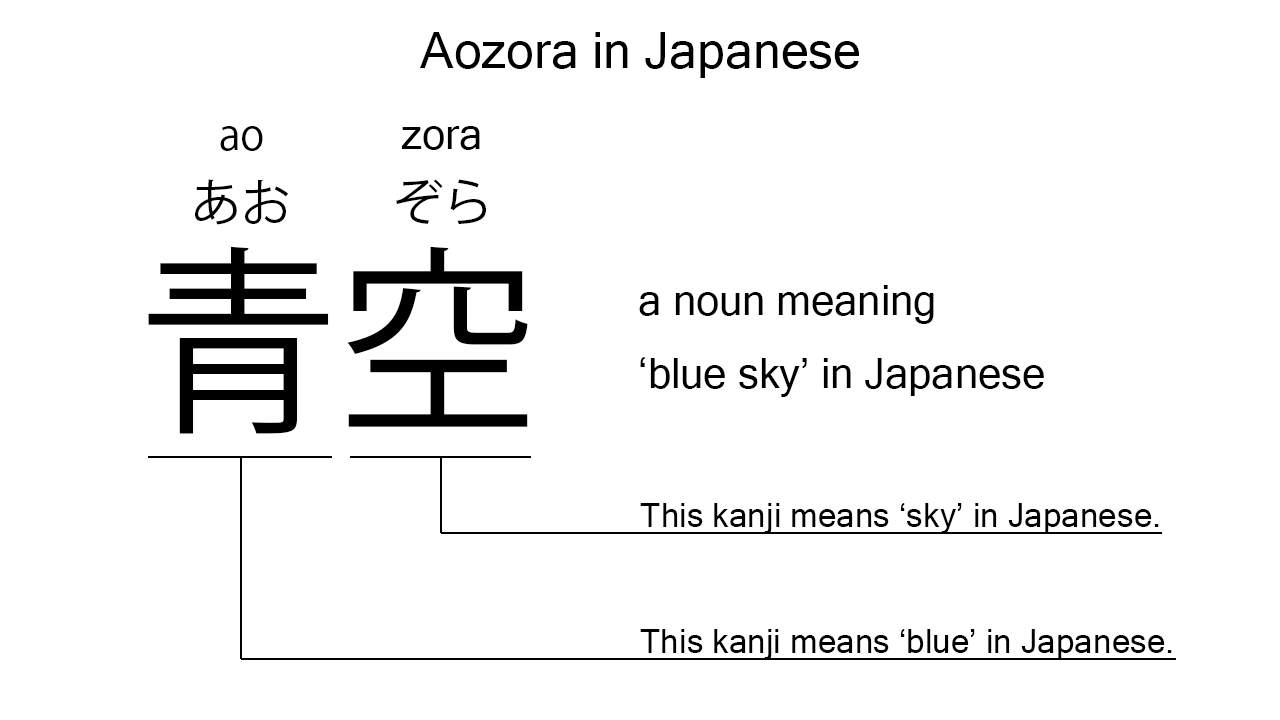What does “aozora” mean in Japanese?
Native speakers say “aozora” to mean ‘blue sky’ in Japanese. Perhaps, some Japanese learners know this word as it is sometimes used in Japanese movies, songs, novels, manga, anime, and the like. In this blog post, however, I will explain this word in detail based on its kanji expression. And also, I will explain how to use it through example sentences. My explanations would help Japanese learners understand “aozora” more clearly. Then, let’s get started!
Contents
Definition and meaning of “aozora”
Let me start with the definition and meaning of “aozora”.
- aozora – 青空 (あおぞら) : a noun meaning ‘blue sky’ in Japanese.
The definition and meaning are very simple and clear. To understand this noun more clearly, however, let me explain its kanji characters in detail, one by one.
Aozora in kanji
The kanji expression of “aozora” consists of the following two kanji characters:
- 青 : a kanji character widely used to mean ‘blue’ in Japanese.
- 空 : a kanji character widely used to mean ‘sky’ in Japanese.
These two kanji characters tell us that the formed noun literally means ‘blue sky’ in Japanese. What the kanji characters express is completely in line with the actual meaning.

When we meet new kanji expressions, we should check their kanji characters in detail to understand their meanings clearly and deeply. In many cases, kanji characters tell us a lot about the meanings of the expressions they form. Actually, here, we could get the better understanding of “aozora” through the detailed kanji check above.
So far, I’ve explained the definition and meaning of “aozora” together with its kanji characters. Then, let me explain how to use it through the example sentences below.
Example #1: how to say “blue sky” in Japanese
boku tachi wa kono aozora ga suki desu – 僕達はこの青空が好きです (ぼくたちはこのあおぞらがすきです)
We love this blue sky.
Below are the new words used in the example sentence.
- boku – 僕 (ぼく) : a pronoun meaning ‘I’ in Japanese. This is used mainly by boys and young males.
- tachi – 達 (たち) : a suffix used after a noun or pronoun to make its plural form. In the example, this is used after “boku” to make its plural form, “boku tachi”, which means ‘we’ in Japanese. Learn more about Japanese plural.
- wa – は : a binding particle working as a case marker or topic marker. In the example, this works after “boku tachi” to make the subject in the sentence.
- kono – この : a determiner used before a noun referring to a thing close to the speaker. In the example, this is used before “aozora” to say “this blue sky” in Japanese.
- ga – が : a case particle used to make the subject word or the object word in a sentence. In the example, this is used after “kono aozora” to make the object in the sentence.
- suki – 好き (すき) : the stem part of the na-adjective, “sukina”, which means ‘favorite’ in Japanese. Native speakers, however, often use this as an individual word to mean ‘to like’ or ‘to love’ in Japanese. In the example, this is used to mean ‘to love’.
- desu – です : an auxiliary verb used after a noun or adjective to make it polite. Probably, this is well known as a part of Japanese desu form. In the example, this is used after “suki” to make it sound polite.
This is a typical usage of “aozora”. In this example, it works together with the determiner, “kono”, to mean ‘this blue sky’ in Japanese.
Example #2: another usage of “aozora”
kyou no aozora wa totemo aoi – 今日の青空はとても青い (きょうのあおぞらはとてもあおい)
Today’s blue sky is very blue.
Below are the new words used in the example sentence.
- kyou – 今日 (きょう) : a noun meaning ‘today’ in Japanese. This can also work as an adverb almost anywhere in a sentence.
- no – の : a case particle joining two nouns. Normally, the first one can work as a modifier to describe the second. In the example, this works to join “kyou” and “aozora”. The formed phrase literally means “today’s blue sky” in Japanese.
- totemo – とても : an adverb of degree meaning ‘very’, ‘much’, ‘so’, or such in Japanese. In the example, this works in front of “aoi” to emphasize its meaning.
- aoi – 青い (あおい) : an i-adjective meaning ‘blue’ in Japanese.
This is another typical usage of “aozora”. In this example, it works as a part of the noun phrase, “kyou no aozora”, which means “today’s blue sky” in Japanese. When we want to mean ‘blue sky’ in Japanese, anyway, this noun is always a very good option.
Summary
In this blog post, I’ve explained the definition and meaning of “aozora” in detail based on its kanji expression. And also, I’ve explained how to use it through the example sentences. Let me summarize them as follows.
- aozora – 青空 (あおぞら) : a noun meaning ‘blue sky’ in Japanese. The first kanji character means ‘blue’ in Japanese; the second means ‘sky’. So, this kanji expression literally means ‘blue sky’ in Japanese. What the kanji characters express is completely in line with the actual meaning.
Hope my explanations are understandable and helpful for Japanese learners.